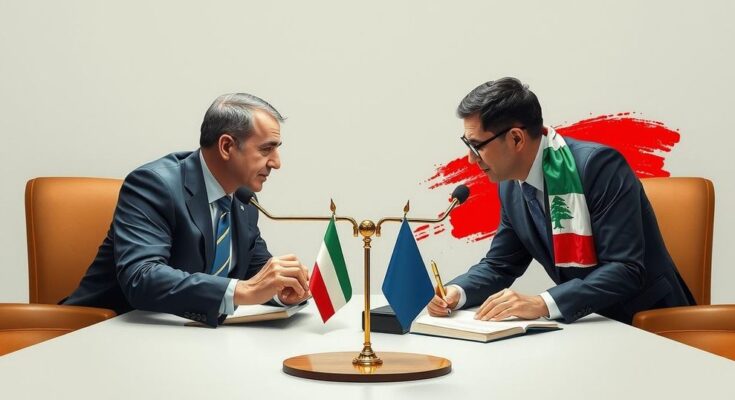Ambassador Ghady El-Khoury discussed the positive implications of Joseph Aoun’s election as President of Lebanon amid pivotal changes in Syria. He highlighted the need for stability in Syria as essential for Lebanon’s recovery. El-Khoury addressed challenges confronting Lebanon, advocating for reforms and diplomatic engagement with Syria and emphasized unity among the country’s political factions to achieve lasting stability and recovery.
In an optimistic discourse regarding Lebanon’s future, Ambassador Ghady El-Khoury emphasized the significance of Joseph Aoun’s election as President and the recent political changes in Syria. After enduring a prolonged institutional stalemate, Lebanon is positioned for a renewed phase of governance. Ambassador El-Khoury noted the potential stabilization of Syria as vital for Lebanon’s recovery, highlighting the encouraging nature of diplomatic engagements with Syria’s new leadership. He underscored the importance of consolidating state authority over militias and initiating economic reforms to address Lebanon’s myriad challenges. Following decades of tensions, this engagement reflects Lebanon’s commitment to fostering political unity and stability, paving the way for more effective governance and humanitarian responses.
The recent political developments in Lebanon, particularly the election of General Joseph Aoun, have been welcomed as significant progress amid an ongoing multitude of challenges faced by the nation. The ambassador’s dialogue prompted reflections on the complex relationships within Lebanon and between Lebanon and Syria, particularly in the context of understanding sectarian dynamics and the historical ties that bind the two countries. Ambassador El-Khoury’s insights present an informed perspective on the intertwined fates of Lebanon and Syria, illustrating how the political landscape in Syria can impact Lebanese recovery and stability.
Put into perspective, Lebanon’s political framework has long been influenced by sectarian composition, necessitating careful navigation through its diverse factions. The lack of a consensus candidate had previously hindered effective governance, thus Aoun’s election is not merely symbolic but a potential harbinger of a new cooperative political climate. Emphasizing the interconnectedness of Lebanese and Syrian stability, El-Khoury illustrates that enhanced relations would allow both nations to overcome significant socio-economic challenges, particularly in light of the humanitarian crises confronting them.
Further elaborating on future priorities, the ambassador articulated the necessity of addressing internal security, restructuring the military, and managing border disputes, particularly concerning Israel. Such initiatives are critical to establishing a solid foundation for long-term recovery and stability in Lebanon, marking a departure from previous periods of stagnation and mismanagement. His acknowledgment of the daunting nature of these challenges signifies a realistic approach, bolstering hope for recovery through unity and continuous reform.
A shared vision for the future emphasizes not only the restoration of stability in Lebanon but also the potential for peaceful collaboration with neighboring Syria. As both nations navigate their immediate goals, the continued support of international allies, particularly from the Vatican and influential regional actors, will be vital in fostering a conducive atmosphere for lasting peace and socio-economic growth in this historically rich yet tumultuous region.
The current geopolitical climate in Lebanon has been tumultuous, characterized by prolonged political stalemate, economic crises, and heightened sectarian tensions. The election of Joseph Aoun as President marks a significant shift after 26 months without a leader, providing hope for the country’s governance. Concurrently, Syria’s political landscape is undergoing drastic shifts following the fall of Bashar al-Assad’s regime, allowing for potential improvements in Lebanese-Syrian relations. Ambassador El-Khoury’s insights reveal the emphasis on establishing collaborative ties to promote stability and mutual growth in a region fraught with historical challenges.
Ambassador Ghady El-Khoury expressed optimism for Lebanon’s stability following the election of President Joseph Aoun amidst significant political changes in Syria. This new phase is seen as an opportunity for Lebanon to consolidate state control, enhance governance, and engage constructively with Syria. As Lebanon grapples with its multifaceted challenges, the interconnectedness of its stability and that of Syria underscores the urgent need for effective diplomacy and internal reforms to foster peace and socio-economic development. The support of the international community remains crucial in navigating this complex landscape.
Original Source: www.vaticannews.va




